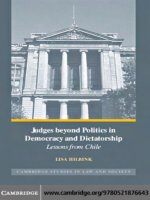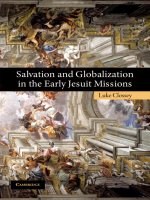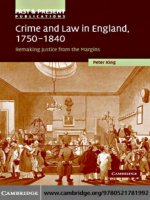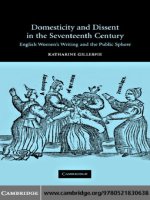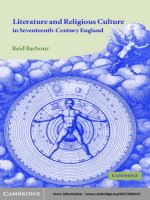0521859085 cambridge university press argument and authority in early modern england the presupposition of oaths and offices apr 2006
Bạn đang xem bản rút gọn của tài liệu. Xem và tải ngay bản đầy đủ của tài liệu tại đây (4 MB, 411 trang )
This page intentionally left blank
Argument and Authority in Early Modern England
Conal Condren offers a radical reappraisal of the nature of moral and
political theory in early modern England through an examination of
widespread arguments about office. The vocabulary of office-holding
and abuse was sufficiently supple and pervasive for us to infer a general
presupposition of office cohering the whole spectrum of social discourse,
from conceptualising the soul to understanding the responsibilities of the
philosopher, poet, parent and priest. The exploration of this vocabulary
involves a reconsideration of the nature of early modern social debate,
challenging fashionable preoccupations with emerging ideologies and
with liberalism, liberty, republicanism, a public sphere, and reason of
state theory, through which study of seventeenth-century political theory
has been organised. Indeed, the very idea of early modern political
theory is called into question. Professor Condren reconsiders the importance of oath-taking, and analyses anew the three great crises of
oath-taking that punctuated English history in the seventeenth century.
Again, his conclusions challenge widely held beliefs about early modern
political argument, the process of secularisation, and the rise of de facto
theory. Argument and Authority is a major new work from a senior
scholar of early modern political thought, of interest to a wide range
of historians, philosophers and literary scholars.
C O N A L C O N D R E N is Scientia Professor in Politics and International
Relations at the University of New South Wales, Australia.
Argument and Authority in
Early Modern England
The Presupposition of Oaths and Offices
Conal Condren
The University of New South Wales
cambridge university press
Cambridge, New York, Melbourne, Madrid, Cape Town, Singapore, São Paulo
Cambridge University Press
The Edinburgh Building, Cambridge cb2 2ru, UK
Published in the United States of America by Cambridge University Press, New York
www.cambridge.org
Information on this title: www.cambridge.org/9780521859080
© Conal Condren 2006
This publication is in copyright. Subject to statutory exception and to the provision of
relevant collective licensing agreements, no reproduction of any part may take place
without the written permission of Cambridge University Press.
First published in print format 2006
isbn-13
isbn-10
978-0-511-16838-3 eBook (EBL)
0-511-16838-1 eBook (EBL)
isbn-13
isbn-10
978-0-521-85908-0 hardback
0-521-85908-5 hardback
Cambridge University Press has no responsibility for the persistence or accuracy of urls
for external or third-party internet websites referred to in this publication, and does not
guarantee that any content on such websites is, or will remain, accurate or appropriate.
To Averil
Contents
Preface
Introduction
page ix
1
Part I: The liquid empire of office
1
An overview
15
2
Ceremonies of office: The kiss of the tutti-man
36
3
Institutionalised office: a sense of the scavenger
54
4
The vocabulary of office
80
5
Offices of the intellect: player, poet and philosopher
105
6
Soul and conscience
125
Part II: The authority and insolence of office
7
The cases of patriot and counsellor
149
8
Casuistry as the mediation of office
172
9
The case of resistance to superior power
186
Metaphor and political autonomy
209
10
Part III: ‘I, A. B.’
11
An overview of the oath in seventeenth-century argument
233
12
Coronation oaths
254
13
The oath of allegiance of 1606
269
vii
viii
Contents
14
Engagement with a free state
290
15
The oath of allegiance and the Revolution of 1688–9
314
Epilogue
343
Bibliography
Index
353
391
Preface
a Man had as good to go to Court without his Cravat as shew himself in
Print without a Preface … The Liberty of Prefacing against Prefaces, may
seem a little Unreasonable; but Common Scribblers are allow’d the
Priviledges of Common Strumpets. One of the Frankest Prostitutes that
ever I knew since I was born, had these Words the oftenest in her Mouth:
Lord! (says she) to see the Impudence of some Women!
(Roger L’Estrange, Tully’s Offices in Three Books,
corrected edn, 1681, A4)
Preliminary studies have announced many of the themes found in the
following pages, and although at times they have made me think I was
adequately prepared for the larger work, this has taken an inordinate time
to complete. In the process I have felt prematurely blasted by antiquity.
But having got this far, there are occasions when I feel as buoyant as Sir
Roger L’Estrange after laying down his onerous and odious offices to
translate Cicero’s. That I can make the comparison is due to many, not
least Dr Paul Spira and the Prince of Wales Hospital.
Something long-winded, obscure and purple, had there been light
enough to see it by, was passed rapidly to readers Professors Jonathan
Scott and John Spurr, who treated it with the astringent professionalism it
deserved and the constructive insight that it did not. Great thanks are
always due to those who labour to save authors from themselves and to
editors like Richard Fisher who handle them with such patience, tact and
encouragement.
I am grateful to the Australian Research Council for the generous
award that allowed me so much time to write and research; to the Folger
Library, and the Huntington Library where I spent time as a Francis
Bacon Fellow I owe the gratitude of any scholar privileged to work in
these peerless institutions. Thanks are also due to the Master and Fellows
of Churchill College, Cambridge for generosity and friendship over many
years, and to the Plume Library for such co-operation under pressures of
time. More personal debts have been incurred to Pat and John Gibson,
Maureen and Charles Fowler, and Professor John and Gail Pryor, Des
ix
x
Preface
Murphy, Mary Lamb and Ben Down, all of whom helped provide the
support and conditions in which I could carry out research; to Professor
Robert von Friedeburg, my gratitude for ever stimulating company,
especially when giving papers in Bielefeld, Amsterdam, London and
Rotterdam. I am indebted to all of the following for their learning and
generosity in drawing essential materials to my attention: to Professors
Tony Cousins, DeAnn De Luna, John Gillies, Jamie Lloyd, David
Saunders, John Schuster, Jonathan Scott, Barbara Shapiro and Richard
Yeo; to Drs Margaret Kelly, Margaret Rose, J. O. Ward, Eric Nelson,
Dirk Moses and John Sutton. Peter Day, the Chatsworth Archivist, and
Dr Charlotte Erwin, Caltech Archivist, gave help well beyond the call of
duty. I have benefited greatly from the insights, example and companionship of Glenn Burgess, Mark Goldie, Ian Maclean, Noel Malcolm, John
Pocock, Richard Serjeantson and Quentin Skinner. Much is owed to ongoing discussions with my research collaborators Professors Ian Hunter
and Stephen Gaukroger and Dr Andrew Fitzmaurice; I am even more
indebted to Dr Cathy Curtis who generously acted as a third reader with
such grace and critical aplomb. One of the great pleasures of academic life
is that these professional debts are also ones of friendship, alas making
thanks seem doubly perfunctory. My colleagues have cheerfully coped
with my erratic presence, or absence, yet have been around when I have
needed them; Aoise Stratford Lloyd has reminded me I have other things
to write; Allegra Zakis that there are things in the world beyond what I
write. My wife Averil has wonderfully born the brunt of the book I have
found most difficult to complete in most trying times for us both. She too
has critically read it in several drafts, prepared the index, and like all who
have seen the bits and bristles of Mr Hume’s broom, has swept out
rubbish. What is left is mine, I should probably keep it to myself, but
while we live we do not learn.
Material towards the end of chapter 3 was first explored in Contemporary Political Theory, 1, 1 (2002); a more detailed version of the argument on
patriotism appeared in Robert von Friedeburg, ed., ‘Patria’ und ‘Patrioten’
vor dem Patriotismus. Pflichten, Rechte, Glauben und die Rekonfigurierung
europa¨ischer Gemeinwesen im 17. Jahrhundert (Wiesbaden: Wolfenbuetteler Forschungen, 2005); some of the argument in chapter 6 was first
developed in Philippa Kelly, ed., The Touch of the Real (Perth: UWA Press,
2002); much of the material on tyranny in chapter 9 has been adapted from
my paper in Robert von Friedeburg, ed., Murder and Monarchy: Regicide
in European History, 1300–1800 (London: Palgrave, 2004). I am grateful
for being allowed to re-work these materials.
_ _ _ _ _ _ _ _ _ _ _ _ _ _ _ _ _ _Introduction
___________________________________________________________________________________________________________________________________
Indeed it is a strange-disposed time:
But men may construe things, after their fashion,
Clean from the purpose of the things themselves.
(Cicero, in Shakespeare, Julius Caesar 1.2)
I
There is now a cohesive literature on political office-holding in earlymodern Britain. Following Ernst Kantorowicz’s seminal study of kingship
has been valuable work on the village constable, on the county Lord
Lieutenant, and more broadly on the judiciary and priesthood.1 The
changing scope of socially instituted office has been recognised as crucial
to the formation of the modern state, political participation and the
outbreak of the Civil Wars.2 Historiographically, the analysis of office
has been held to be central to the reintegration of social and intellectual
history.3 Nevertheless, notions of office have been too narrowly conceived
and far less attention has been given to how people argued about offices,
1
2
3
Ernst Kantorowicz, The King’s Two Bodies: A Study in Medieval Political Theology
(Princeton, 1958); V. I. Slater, Noble Government: The Stuart Lord Lieutenancy and the
Transformation of English Politics (Athens, Ga., 1994); J. R. Kent, The Village Constable,
1580–1642 (Oxford,1986); Justin Champion, The Pillars of Priestcraft Shaken: The Church of
England and its Enemies, 1660–1730 (Cambridge, 1992); Wilfred Prest, ‘Judicial Corruption in
Early Modern England’, Past and Present, 133 (1991), pp. 67–95; Alan Cromartie, The
Constitutionalist Revolution in Early Modern England (Cambridge, forthcoming).
Michael J. Braddick, State Formation in Early Modern England, c.1550–1700
(Cambridge, 2000); Mark Goldie, ‘The Unacknowledged Republic: Office-Holding in
Early Modern England’, in Tim Harris, ed., The Politics of the Excluded, c.1500–1850
(London, 2001), pp. 153–94; Cromartie, The Constitutionalist Revolution, chs. 1, 8; Steve
Hindle, The State and Social Change in Early Modern England, c.1550–1640 (New York,
2000); see also Craig Muldrew, The Economy of Obligation: The Culture of Credit and
Social Relations in Early Modern England (New York, 1998).
Goldie, ‘The Unacknowledged Republic’, p. 154 and at length; Hindle, The State, pp. 1–37.
1
2
Argument and Authority in Early Modern England
to what an office was taken to entail, and how and to what ends the
vocabulary of its specification was actually deployed.4
The argument here is that from the evidence of language, we may
properly conjecture what I shall call a presupposition of office broadly
characteristic of early modern England. By restricting attention to designated political offices, we decipher, as it were, without a key, and do
injustice to debate that went well beyond them. We may even beg questions if, a priori, we marginalise some forms of office talk as only derivative of core political concepts. This study, then, is intended as a change of
direction for, and an exploration of the implications of, the literature on
early modern office.
It also arises directly from my earlier work and is prefatory to a
theoretical account of metaphor, theoretical modelling and concept
formation in politics. Thus, it is one of a series and follows principally
from The Language of Politics in Seventeenth-Century England.5 That
work outlined what I took to be the main patterns of word use in politics
from which we hypothesise intentions, theories and dispositions. One
initial proposition had been that the putative subject matter of intellectual and cultural history (ideas, concepts, beliefs, ideologies) is largely
what is conjectured in order to establish a narrative, or descriptive
coherence from surviving evidence. Such processes of hypothetical completion are commonly given a misleading ontological status. That is,
hypothetical completions (X ’s alleged ideas, concepts, intentions and
so forth) purporting to explain or make greater sense of what we have,
are characteristically projected as an available reality, and this is used to
redescribe surviving evidence, so pre-empting understanding. Effectively, the meta-language of explanatory modelling is conflated with the
evidence itself, and the past is then easily, even inadvertently, reduced to
a series of variations on the present.6 Consider office-holding and state
formation: a modern Weberian model of the state may cast light on the
interplay of social office in pre-modern England, but if the terms of the
4
5
6
For notable exceptions see Stephen Gaukroger, Francis Bacon and the Transformation of
Early-Modern Philosophy (Cambridge, 2000); Knud Haakonssen, Natural Law and Moral
Philosophy: From Grotius to the Scottish Enlightenment (Cambridge, 1996); Ian Hunter,
Rival Enlightenments: Civil and Metaphysical Philosophy in Early Modern Germany
(Cambridge, 2001); Robert von Friedeburg, Self-Defence and Religious Strife in Early
Modern Europe: England and Germany, 1530–1680 (Aldershot, 2002).
Conal Condren, The Language of Politics in Seventeenth-Century England (London, 1994).
See also, for example, Philippe Buc, The Dangers of Ritual: Between Early Medieval Texts
and Social Scientific Theory (Princeton, 2001), pp. 2–3, and pt. 2 at length; Francis West,
‘The Colonial History of the Norman Conquest’, History, 84 (1999), pp. 219–36.
Introduction
3
model are read into the evidence, explanatory circularity is almost as
inescapable as anachronistic description.7
The Language of Politics concentrated on the semantic residue from
seventeenth-century England, and how it has been susceptible to rough
treatment by modern scholars who, taking their own conceptual vocabulary for granted, have read it into the past. In particular, the terms radical,
moderate, conservative, and their near relations left, right, centre, have
been used with a redescriptive insouciance that has anachronistically
distorted early-modern debate.8 For all the breadth of brush-stroke, it
was argued that my case was incomplete because of inadequate attention
to the conjectured principles, ideas and concepts to which I occasionally
alluded.9 The point was well made, and this study is an attempt to rectify
the imbalance. The purpose is to hypothesise a presupposition of office as
an explanans for the sort of word use I have previously described and
much more besides. It may or may not play a part in explaining state
formation, but a thorough exploration of the linguistic terrain of office
would seem to be a precondition for the success of that adjacent enterprise,
just as it is for tracing specific theories of office as responses to a changing
world. Indeed, if office-talk was as ubiquitous as I claim it was, the whole
notion of early-modern political theory needs to be reconsidered.
II
A comment is in order about my vocabulary of intellectual conjecture, lest
the body of the argument be mistaken for an attempt to unmask an ideology, or write a conceptual history. A presupposition is something that in a
given context is taken for granted; it is apt to be relatively general and
constant but may be disclosed in a finite array of differing propositions.
Indeed, this adaptive capacity is a salient feature of presuppositional
constancy.
Any statement takes something for granted, otherwise nothing can be
said. The vision of a philosophy without presupposition has survived from
Plato and remains an image of the philosopher’s stone,10 but especially in
the cut and thrust of everyday argument much is presupposed. Since any
presupposition is a condition for saying certain sorts of things, in a
7
8
9
10
Braddick’s reliance on Weberian modelling is taken up in chapter 10; but see also Hindle,
The State, pp. 20–4. My point, however, is not to dismiss model-building but, in advance
of a separate study, to point to the difficulties we share accepting its necessity.
Condren, The Language of Politics, ch. 5; Conal Condren ‘Radicalism Revised’ in G.
Burgess and M. Feinstein, eds., British Radicalism, 1500–1800 (Cambridge, forthcoming).
Glenn Burgess, ‘Review’, History of Political Thought, 16, 4 (1996), pp. 638–9.
E.g. Michael Oakeshott, Experience and its Modes (Cambridge, 1933, 1966).
4
Argument and Authority in Early Modern England
minimal sense it is also a guarantee against saying others. Hypothesising
presuppositions, in short, is a matter of the imaginative mapping of
a common ground between interlocutors, indicating the limits and conditions that enabled them to debate and differ; it may be to outline a
perspective more or less adequately shared, a habitus, to borrow Bourdieu’s useful term.11 To hypothesise presuppositions, then, is not to specify anything as cohesive as a doctrine, a theory, a set of ideas, concepts,
an ideology or anything that might be mistaken for an independent object
or agent. It is simply to suggest what is tacitly accepted at a given point in
order that something might be said. Effectively, a presupposition comes to
us as the contingent silence that helps structure the diversity of discourse.
If the generality and stability of presuppositions at once frame and
facilitate argument, their status is hardly immutable, for a presupposition
is a function of language use and may become a focus of debate. Even a
clarificatory statement such as ‘what I am presupposing is x’ places x on
the verge of becoming an axiom, an article of faith, or a doctrine. Under
pressure, with a breakdown of communication, or with infinite leisure and
assiduity, presuppositions can always be converted by explication; but this
may amount less to a shared articulation than a crumbling of the commonly held and the alienation from a habitus. In the loss of relative
constancy, what had been presuppositional may become visible, shaped
and constrained in contestation. That survival is the historian’s hard
evidence of words on paper.
Presuppositions are like the concepts or ideas into which they can be
converted in that none of them amount to an available extra-linguistic
realm to which the historian has access, a world of ideas to be discovered
in any literal sense of that slippery term. Declamations about historical
discovery can run the gamut from meaning found, to having made better
sense of, to being persuasive. There is, however, much value in R. G.
Collingwood’s specification of an idea as an answer to a question, with the
proviso that frequently the question has also to be conjectured.12 Often,
the absence of a contradictory hypothesis is enough to get the idea established as a conclusive fact. This is not unreasonable, but from there the
idea is easily reified as part of a realm of evidence of which histories can be
written, and this is less warranted.
So too with the historical notion of a concept: it is largely a metalocution in language signalling a process of classification and alignment
of particulars. Seen in this fashion, the word concept is not a reference
11
12
Pierre Bourdieu, Esquisse d’une the´orie de la pratique (Geneva, 1972), trans. Richard
Nice, An Outline of a Theory of Practice (New York, 1977).
R. G. Collingwood, An Autobiography (Oxford, 1939), chs. 4, 5.
Introduction
5
term for an independent entity that might be discovered or reflected in
language. It is a relic of a linguistic practice, and by its use we signal
considerable descriptive latitude with respect to the phenomena under
discussion, imposing some order on the world, or identifying the attempts
of others to do so. Additionally, we may also be making claims for robust
continuities within and across natural languages. The importance of this is
not to be gainsaid; it is in part what hypothesising presuppositions is
about, but tracing broadly stable patterns of usage in language does not
seem to me sufficient for positing a distinct ontological realm for basic
concepts (Grundbegriffe), to be located somewhere between language and
social reality, so acting, to employ Reinhart Koselleck’s metaphor, as
joints linking the linguistic and social worlds.13 This is an unfortunate
image, as the joint suggests less a separate realm than the manner in which
two extensions connect and move in concert. It is, nevertheless, exactly
this propensity to conceptual hypostatisation that takes Begriffsgeschichte
back towards its point of critical departure, the Lovejoyan history of ‘unit
ideas’ invented in the service of grand, even whiggish narratives of conceptual consumation.14 And, to repeat, it is this shared treatment of
concept terms that most readily facilitates what Begriffsgeschichte wishes
to avoid: the projection of ‘present day concepts back into the past’.15
There is, in fact, a whole family of terms in historiography – presupposition, assumption, concept, idea, belief, intention, motive – that are, as it
were, like the spirits of an absent world, largely inferred from marks on
paper. We invoke them as a special class of causes for known effects, and
such invocations are, as the Galenic theorist of witchcraft John Cotta put
it, matters of ‘artificial conjecture’. They are voice changes made to
maintain or re-establish intelligible order;16 and they are always vulnerable to alternative conjectures and to accusations of anachronism, overreading, under-reading and irrelevance. It is the lacunae in evidence that
best facilitate accommodation to the present; one way or another we have
to supplement what survives for us to ponder or plunder.17
13
14
15
16
17
Reinhart Koselleck, ‘Response’, in Hartmut Lehmann and Melvin Richter, eds., The
Meaning of Historical Terms and Concepts: New Studies in Begriffsgeschichte
(Washington D.C., 1996), p. 61; this is not dissimilar to words, concepts and things as
the parameters of meaning suggested by C. K. Ogden and I. A. Richards in The Meaning
of Meaning, in 1923.
For astute comment, see Donald R. Kelley, ‘On The Margins of Begriffsgeschichte’, in
Lehmann and Richter, The Meaning of Historical Terms and Concepts, pp. 35–40;
Hunter, Rival Enlightenments, pp. 1–2.
Kosselleck, ‘Response’, p. 67.
John Cotta, The Assured Witch (1624 edn.), pp. 21, 2, 7; cf. W. B. Gallie, Philosophy and
the Historical Understanding (London, 1964), pp. 105ff.
Conal Condren, The Status and Appraisal of Classic Texts (Princeton, 1985), ch. 9.
6
Argument and Authority in Early Modern England
This study, then, deals principally with the more or less shared vocabulary of seventeenth-century moral discourse and the presuppositions that
may plausibly be conjectured from it. By postulating a presupposition of
office, I believe it is possible to make good sense of how the vocabulary of
social discussion was organised. To put the matter the other way around,
from an examination of the vocabulary of argument one can reasonably
hazard a fairly simple pattern of presuppositions about human moral,
social identity, widely shared over a longue dure´e. This book would not be
worth writing if they were our presuppositions, ‘our’ meaning modern,
usually western scholars. But they are not, and by conjecturing or projecting our own understandings of human identity, we, that is modern, usually
western scholars, parochialise and impoverish the past. The hypothesised
presuppositions central to this study function like Koselleck’s ‘basic concepts’, without the metaphysical baggage that gives us a conceptual realm
by separating language from society, and without restricting us to that
historical minority who use their vocabulary in an acceptably abstract and
philosophical fashion. We can, likewise, recognise John Cotta’s sensitivity
to the conjectural status of many sorts of inference without believing in a
spirit world of angels, witches, demons and familiars.
III
To offer the most general analytic abridgement: the presupposition of
office took proper conduct to be by a persona as a function of office;
conversely, improper conduct was office abuse. In extremis, abuse
sloughed off persona, and erased, sometimes almost by definition, moral
identity and social standing.18 Superficially, this may seem suggestive of
theories of social role-play associated with writers such as Marcel Mauss
and, more recently, Erving Goffman.19 Our now rather diluted understanding of a persona would encourage this, especially as the word itself
was originally the Latin for a theatrical mask (from Greek, prosopon) and
later a person. Persona, however, conveyed more than the notion of a roleplaying individual, which naturally directs attention to the relationship
between inner agent and presented identity, to authenticity, dissimulation and appearance. It was, rather, a manifestation, or realisation and
18
19
If thoroughly schematised, this presupposition might even be reformulated in logical
notation as a variation on Leibniz’s law of identity; see David Wiggins, Identity and
Spacio-Temporal Continuity (Oxford, 1988). Or, in Wittgensteinian terms; it is a matter of
‘seeing as’ a manifestation of one putative office or another.
Erving Goffman, The Presentation of the Self in Everyday Life (New York, 1959); Erving
Goffman, Frame Analysis; An Essay on the Organisation of Experience (New York, 1983);
Braddick, State Formation, pp. 76–8.
Introduction
7
representation of a character, or type, such as a young slave, an old man, a
free woman.20 Social role theory can certainly provide insight but it is apt
to present a rather fragmented understanding of office that a physical
person qua persona embodied, and has been developed in the context of
rather different perceptions of moral identity. Indeed, so far from merely
being roles assumed, officia could be formalised as moral beings, making
even the notion of an office as a duty itself sometimes misleadingly
incomplete.21 I will touch on the modern fate of office only in the epilogue,
but will make clear the differences between office-holding and social
role-play where it seems appropriate.
The first part of the book is an attempt to elucidate the nature and
pervasiveness of an expectation of office in early-modern, especially seventeenth-century England.22 My discussion offers a perfunctory sort of
descriptive metaphysics. In Individuals, P. F. Strawson referred to the
relative stability of the presuppositional commonplaces which were at
once features of the least refined thinking and the ‘indispensable core of
the conceptual equipment of the most sophisticated human beings’.23 I
believe something like this applies to evocations of office in the earlymodern world. Clarification involves cutting across familiar organisational topics for early-modern intellectual history, such as the concept of
citizenship, of liberty, rule and tyranny. The discussion of such words is
intended to illuminate differing aspects of the rhetorics of office-holding.
This practice might seem initially repetitive and disparate by turns if it is
assumed that the concept or idea of citizenship, or say republicanism, and
so on, should provide the focus. It will seem less so if it is kept in mind
that the office is what matters, other familiar topics being the means to
its elucidation. Similarly, there is no systematic single discussion of a
figure like Thomas Hobbes, who persists in rounding off a number of
my chapters; what is said of his writings is tied to the aspects of office
under consideration.
The purpose, however, is not to reduce seventeenth-century argument
to some theoretical monochrome. A shared presupposition at a high level
of generality hardly prohibits its being worked into many theoretical
shapes; and the differences arising from what is shared, of comparable
doctrines and of whole types or modes of theorising, may be of more
20
21
22
23
Leonhard Schmitz, ‘Persona’, in William Smith, ed., A Dictionary of Greek and Roman
Antiquities (London, 1882), pp. 889–93.
See Haakonssen, Natural Law, pp. 40–2; Hunter, Rival Enlightenments, pp. 165–6.
The expression ‘early modern’ must be taken throughout only as a Schopenhaurian
nominal classification, a conceptually empty convenience for the period c. 1500–1800.
P. F. Strawson, Individuals: An Essay in Descriptive Metaphysics (London, 1971 edn),
p. 10.
8
Argument and Authority in Early Modern England
interest than the often unexamined common ground. John Donne’s poetic
exploration of the imagery of office is a world away from, say, Pufendorf ’s
studied account of society; the solipsistic lovers in ‘The Sunne Rising’ (see
chapter 8) were hardly entia moralia. So, too, a posited presuppositional
grounding used to collapse one perspective into another risks losing
everything that might be interesting about each. Yet Donne’s poetic
commonplaces, to recall Strawson’s point, do touch on Pufendorf ’s
theory; for he played with what Pufendorf would critically examine and
affirm – that an office provides an expectation of and the boundaries for
proper conduct.24 For the purposes of this study Pufendorf might be
considered an honorary Englishman, not because of his seminal abridgement of a whole philosophy of office, but because he developed it in
constructive counterpoint to Hobbes, who in turn had reduced inherited
presuppositions of office in a way far more disruptive than Donne’s poetic
ingenuity. In fact, it may have been Hobbes’s draconian subversion of the
complex culture of official expectation that provoked Pufendorf to a
formal articulation of a theory of the human world as an intersection of
offices. He flew, like the proverbial owl of Minerva at dusk, returning to
England through translation, redaction and his own astute comments on
English affairs.25 Traversing the common ground between the crepuscular
Pufendorf and Donne of the morning sun can be treacherous in the mix of
shadows they cast; but the attempt to do so should help explain the
specific content of the vocabulary as a whole, and how it was worked
into a remarkable diversity of doctrine in England and beyond. Not all
of this doctrine was in any helpful sense ‘political’, either according to
seventeenth-century uses of that word, or our own. Indeed, the notion of
the political is variable, and an exploration of the pervasive ethos of office
will do something to account for its uncertain status and the ease by which
those whom we see as political actors could dispense with it.
Presuppositions rarely come to us in splendid isolation; we are not, as it
were, dealing with a single refracted broomstick in the water, but with a
besom barely bound. And there must remain some distorting partiality
about following one presupposition to the neglect of its closest neighbours. Most crucially, a semiotic presupposition about the meaningfulness
24
25
Samuel Pufendorf, De jure naturae et gentium libri octo (1672), trans. C. H. and W. A.
Oldfather (Oxford, 1943); Hunter, Rival Enlightenments, pp. 164–6.
Andrew Tooke, The Whole Duty of Man According to the Law of Nature (1691),
translation of Samuel Pufendorf, De officio hominis (1673), ed. Ian Hunter and David
Saunders (Indianapolis, 2003); Michael J. Seidler, ‘Qualification and Standing in
Pufendorf’s Two English Revolutions’, in R. von Friedeburg, ed., Widerstandsrecht in
der fru¨hen Neuzeit, Zeitschrift fu¨r Historische Forschung, Beiheft 26 (Berlin, 2001),
pp. 329–52.
Introduction
9
of the world, that everything in it is a sign, shadows this study. The very
notion of a sign was accommodating, ranging from symptom to synecdoche, effect, residue and prognostic. According to Thomas Browne, all
were the marks made by the pencil of God, a God it was also presupposed
who had to be feared.26 The conjunction of the planets might explain or
forewarn; the wart might condemn; the very black cat might be the scratch
of Satan on the soul of the witch. The flexible faith in the world as one of
signs, meaning and interconnections, from medicine and witchcraft to
religious ceremony and scientific experiment, helped shape and sustain
the ubiquity of office and evidence of its abuse.27 All things might be
‘instruments of fear and warning/Unto some monstrous state’, insinuates
Cassius, as he spins his conspiracy on a stormy night to cleanse Rome of
Caesar.28 ‘The night’, wrote Thomas Nashe, ‘is the devil’s Black Book’,
and Nashe saw inscribed on its pages forms of illness, human types, the
peculiarities of nature, dreams, terrors and spirits, in the realm where
Satan could be revealed as a tyrant and a Machiavellian, inverting or
challenging all good order glorious in the light of God’s sun.29 For Robert
Dingley, when that sun was obscured by thundering clouds we might be
hearing His voice, and to stop the ears against the din could be nothing
short of rebellion.30 Although fear of an omniscient deity and a semiotic
presupposition are not the focus of this study, so closely are they tied to
the vocabulary of office that its exploration is an intimation of them both.
This will become most obvious in part III. Oath-taking and administering
were not only the quintessence of office in action, but they also generated
controversy because of the different ways in which oaths could be signs,
and because of their portentous evocation of a most fearsome God. No
atheist could hold office, because oaths could signify nothing in the
absence of a recognised divinity.
26
27
28
29
30
For a fine discussion of this presupposition, see David Wootton, ‘The Fear of God in
Early Modern Political Theory’, in Historical Papers (Vancouver, 1983), pp. 58–80.
For suggestive explorations of semiotics, John Gillies, Shakespeare and the Geography of
Difference (Cambridge, 1996); Ian Maclean, Logic, Signs and Nature in the Renaissance
(Cambridge, 2002).
Shakespeare, Julius Caesar 1.3.
Thomas Nashe, The Terrors of the Night (1594), in The Unfortunate Traveller and Other
Works, ed. J. B. Steane (Harmondsworth, 1972 edn), p. 208; also Shakespeare, King Lear
3.4, for the tyrannous night.
Robert Dingley, Vox coeli, or Philosophical, Historicall and Theological Observations of
Thunder (1658), pp. 61, 67; cf. writers like Joseph Glanvill who though seeing ‘Real’
philosophy as the enemy of such superstition nevertheless saw all the works of nature as
provable signs of God’s existence: Joseph Glanvill, Philosophia pia (1671), pp. 17–23,
48–52; cf. more extensively, Sir Robert Boyle, The Christian Virtuoso, part 2, in Works,
ed. Thomas Birch (London, 1772), vol.VI, pp. 717–96.
10
Argument and Authority in Early Modern England
In the serious business of studying seventeenth-century political theory
it has been fairly routine to brush aside much of this cobweb of presuppositional entanglements, consigning some to a realm called religion, a
residue to superstition. Reading, if we bother, the warnings of Mr Dingley,
we instinctively side with the voice of Cicero on that stormy night before
the assassination of Caesar: ‘men construe things after their own fashion,
clean away from the purpose of the things themselves’. Indeed: but to
abstract a discrete political theory clean away from all such stuff is itself to
construe things after our own presuppositional fashions. In fact, much
language use such as Dingley’s fear of ‘rebellion’ against God’s meteorological messages made it difficult to maintain any clear-cut domain of the
political. This was especially where Satan was designated a tyrannical
Machiavell and God was ensconced in the office of cosmic rule. Certainly,
the political was at times variously identifiable, but it was not the autonomous realm the expression ‘political theory’ has led us to expect, and
which is still sometimes projected as a crucial ‘discovery’ of the earlymodern world (chapter 10). Seeing the world as a text is hardly new.31
Reading the Bible through notions of allegory, typology and figurative
correspondence was often enough a model for imposing order on the rest
of creation, and above all for facilitating the celerity of metaphorical
movement between established linguistic domains. The vocabulary of
office was made to reach from the sun to sunny King James, from the
stomach to the philosopher. The darker side of office-abuse was similarly
elastic, being stretched from the adulterer or neglectful constable, the stage
villain, contumacious counsellor and over-puissant prince, to the inconstant moon and the Prince of Darkness.32 By the time I reach the epilogue,
I will have come as close as I can to suggesting that in the name of
historiographical purity we might dispense with the organising notion of
early-modern political theory. It is, no doubt, a proof that purity is not
everything.
IV
The argument is continuous but is divided into three broad parts. Part I is
a preliminary survey of the extent and form of office, but, for orientation,
chapter 1 gives an overview, though not a point by point summary,
of parts I and II. That chapter ends by drawing out some of the consequences of a presupposition of office for understanding what we see as
31
32
James Franklin, ‘Natural Sciences as Textual Interpretation: The Hermeneutics of the
Natural Sign’, Philosophy and Phenomenological Research, 44, 4 (1984), pp. 509–20.
Robert Anton, ‘Satyr of the Moone’, in The Philosophers Satyrs (1616), pp. 69–75.
Introduction
11
seventeenth-century political theory and for a range of fashionable lines of
enquiry into it. Enough is said only to show how often unexamined
perspectives can impose an anachronistic structure on the past. Chapter 2
outlines sketchily the ceremonies and solemnities expressive of the
diversity of office, from folkloric survivals to pageants and masques, while
chapter 3 addresses the range of institutionalised social office. Taken
together, these chapters provide only a rough backdrop to the more
extensive rhetorics of office-talk. Dependent largely on extant literature,
they might be tripped over fairly lightly by those expert in social history,
but for what is made of the labours of others. The scene set, chapter 4
outlines the terms and expressions broadly constituting the ethics of office
and its abuse. It is an overview of the vocabulary of office as a whole,
encompassing the ways in which words were used to promote and to
criticise office-holders, applied, or withheld to solidify, endow or evaporate official standing. Chapters 5 and 6 explore the extension of this
vocabulary away from socially instituted offices in order to map the full
range of its deployment with reference to human identity. Within this
context of use, chapter 7 deals with the complementary examples of the
rather differently contested offices of patriot and councillor. In chapter 8,
I examine the function of casuistry in mediating the tensile ethics of office.
The principal example, elaborated in chapter 9, is the case of resistance to
authority. As the enlistment of the vocabulary of office could often be
loose and now appears forced and fancifully metaphorical, part II concludes by explicating some of the problems involved in dealing with
metaphors of office. Figurative use was made plausible by assumptions
about the world, by meta-assumptions about semiotic interconnection,
and in outlining these, the ground is prepared for a reconsideration of the
autonomy of politics thesis and reason of state theory.
Like social office-holding, oath-taking is beginning to attract scholarly
attention commensurate with its importance in the seventeenth century,
but it is yet to be explored within the primary context of the rhetorics
of office. Oath-taking was a vital manifestation of asserted and accepted
office, and so controversies around the notion of an oath reveal much
about the difficulties inherent in an office-driven world. Two short chapters begin part III. Chapters 11 and 12 provide initial orientation by
discussing, respectively, oaths in general and coronation oaths in particular. Longer chapters are devoted to the most famous of oath-taking
controversies. Chapter 13 is on the oath of allegiance following the Gunpowder Plot in 1605; chapter 14 concerns the Engagement required after
the establishment of a republic in 1649; chapter 15 focuses on the oath of
allegiance following the Revolution of 1688–9. Were they exhaustive,
these discussions would be intolerably repetitive, not least because the
12
Argument and Authority in Early Modern England
vocabulary of office remained remarkably stable, the disputes at the end of
the century echoing much earlier stridency of debate. Rather, part III
marks the shift from a broadly synchronic mapping of the effects of a
presupposition of office to a more diachronic illustration of its workings in
argument. This allows for more attention to the development of specific
doctrines with the resources of the vocabulary; it allows also for more
illustration of the way in which, with the aid of our own presuppositions
about the world, we have attributed theories that the evidence inadequately supports. In this way, too, the fairly disparate patterns of illustration necessary for an overview give way to the conventional
concentration on relatively cohesive bodies of evidence. The last three
chapters explore differing aspects of the intractable difficulties of officeholding and oath-taking in a fissiparous world. Eventually, through deep
dispute and presuppositional breakdown, came change; and alterations in
the presupposition of office and its vocabulary erratically evidence the
erosion of a way of seeing things morally. I do not argue for there being
any decisive scene change appropriate to the structure of a pantomime, or
a teleological narrative driven by reified concepts emerging clearly and
late in full glory. If the ground has been convincingly prepared, the
discussion of the cases of oath controversy should not need the Mahleresque crescendo expected of ambitious arguments. An epilogue, however,
outlines some of the salient contrasts between what was once taken for
granted and more familiar ethical postures; it suggests reasons for a
decline in an ethos of office and revisits the consequences of this for
understanding early-modern political language and modern political and
moral enquiry.
Part I
The liquid empire of office


